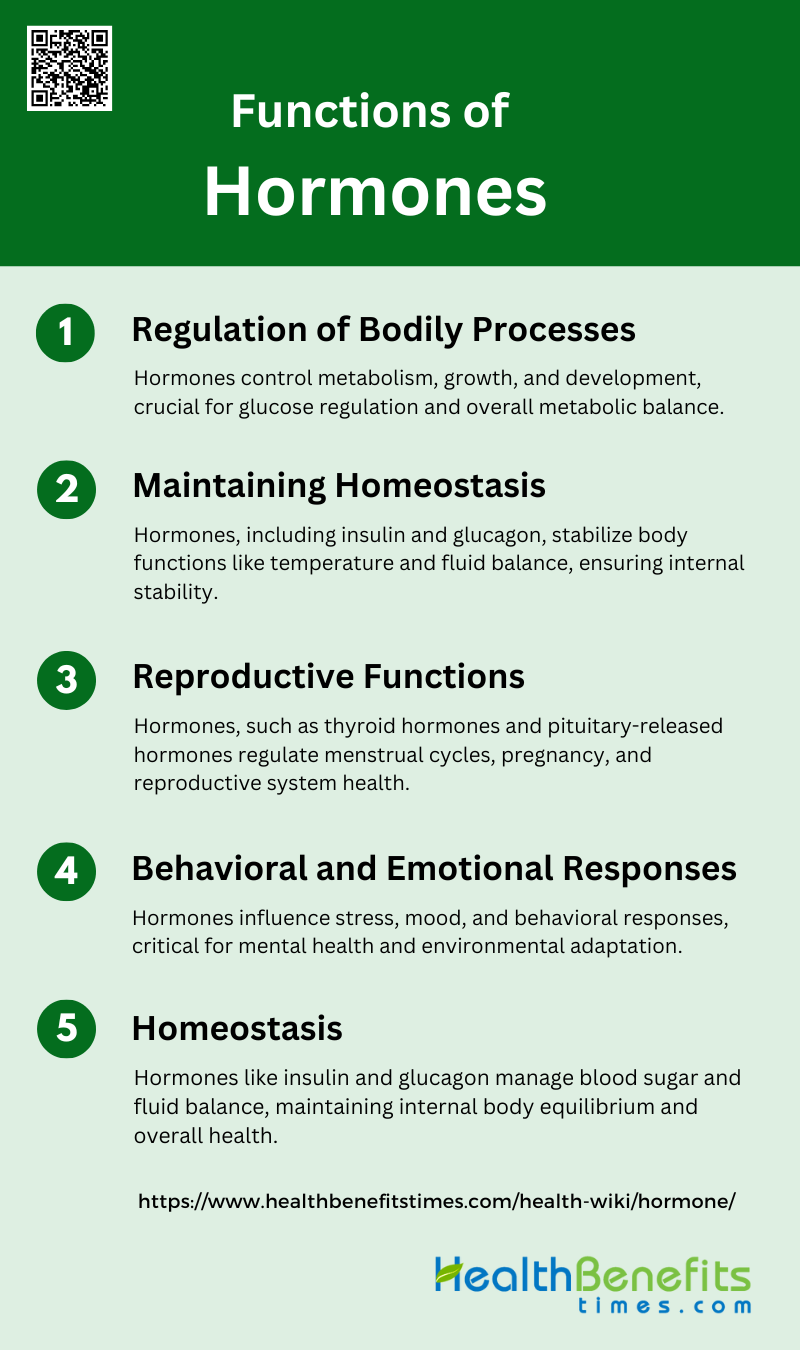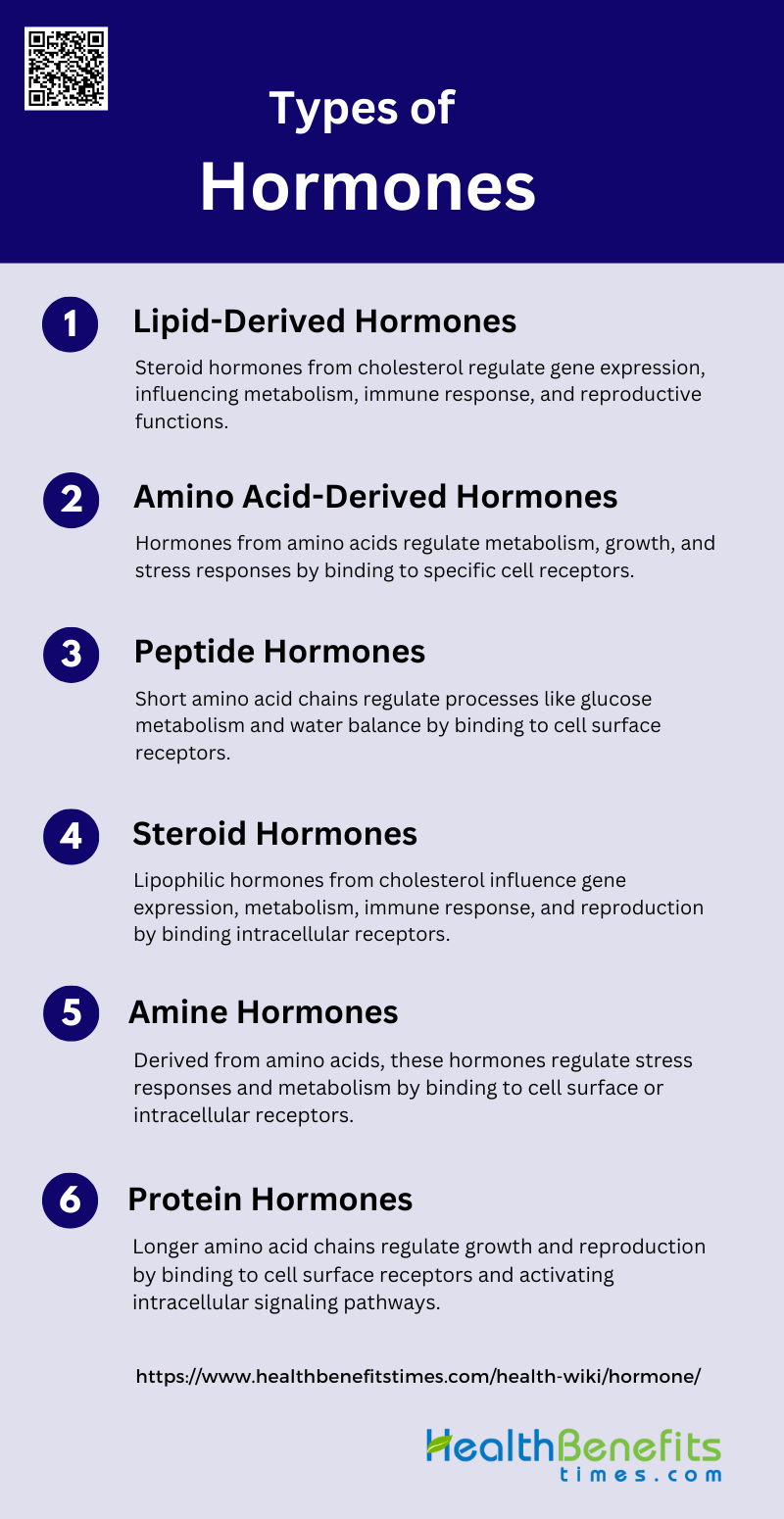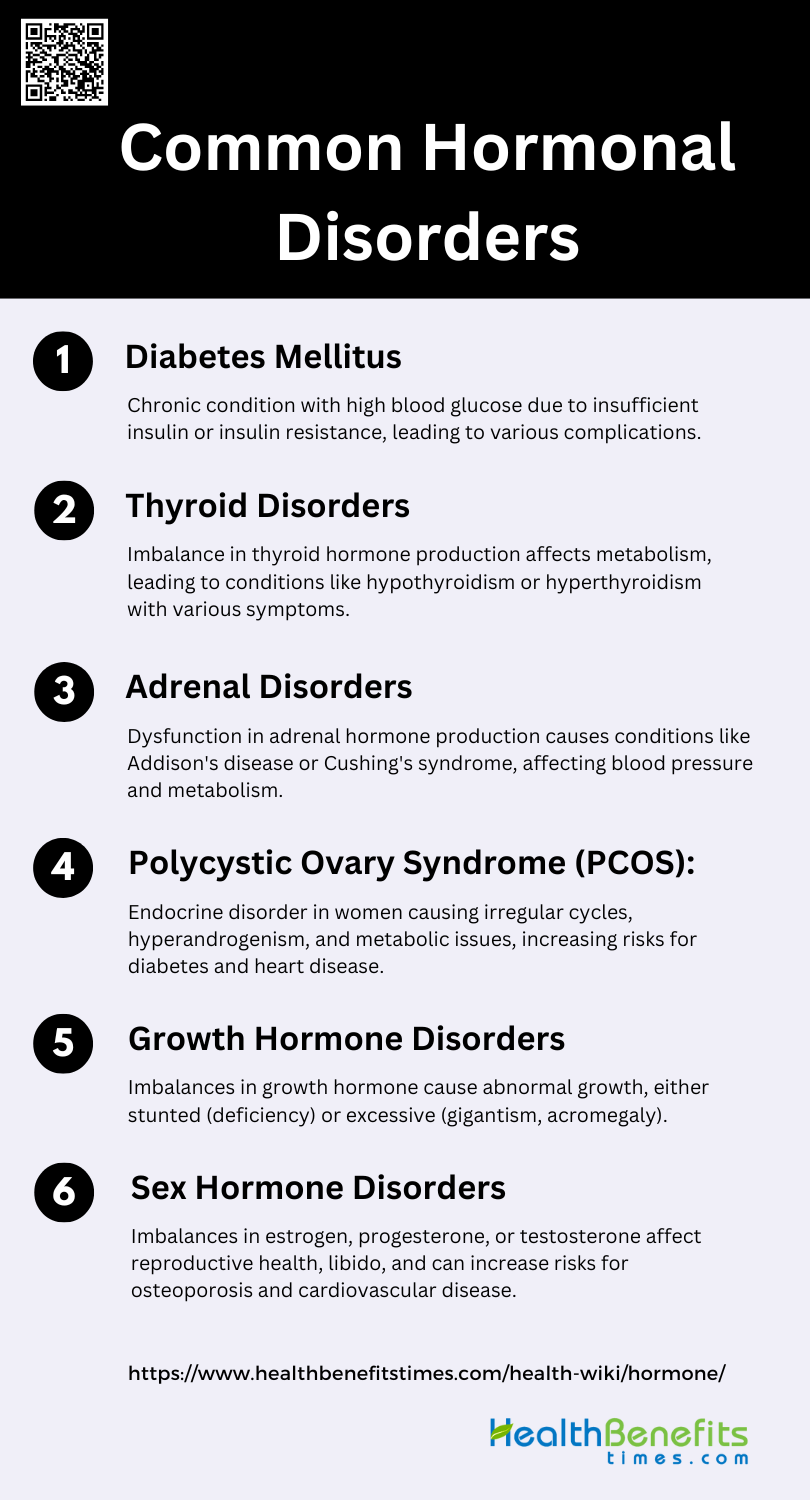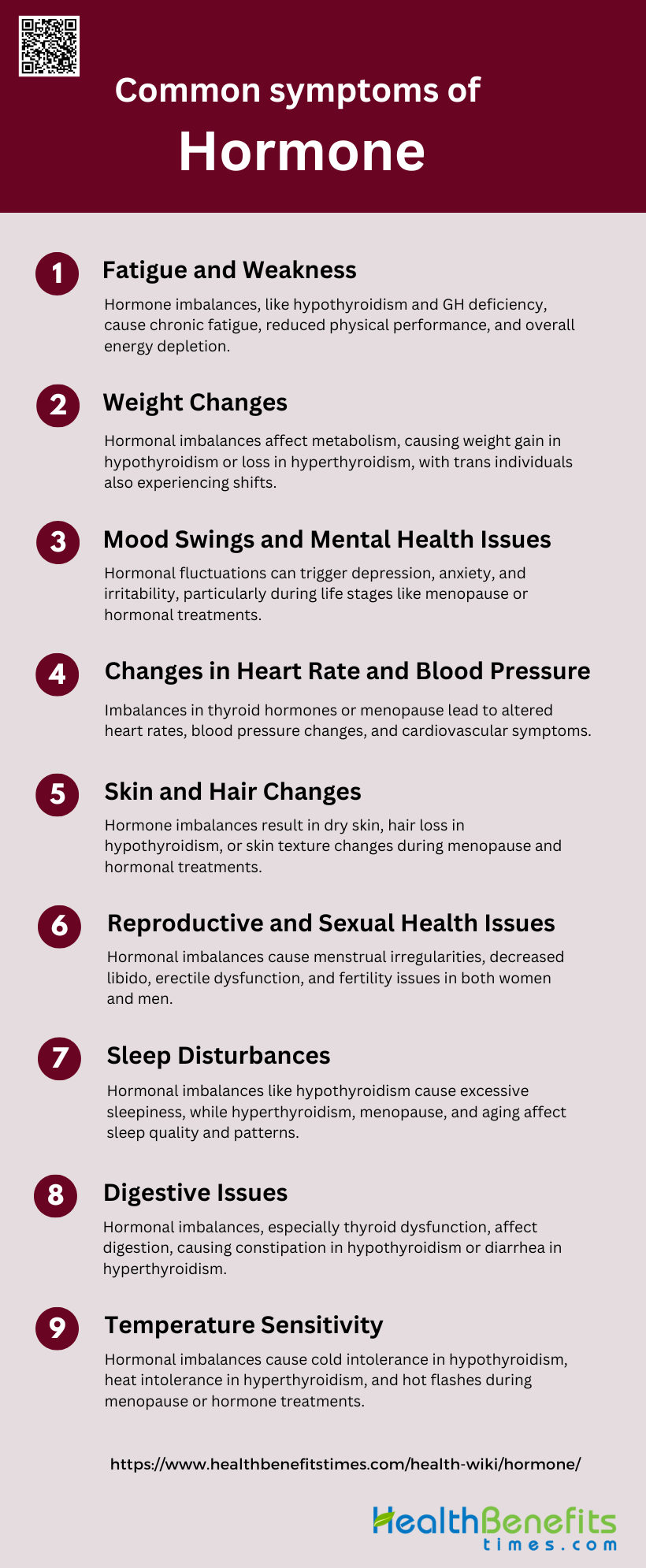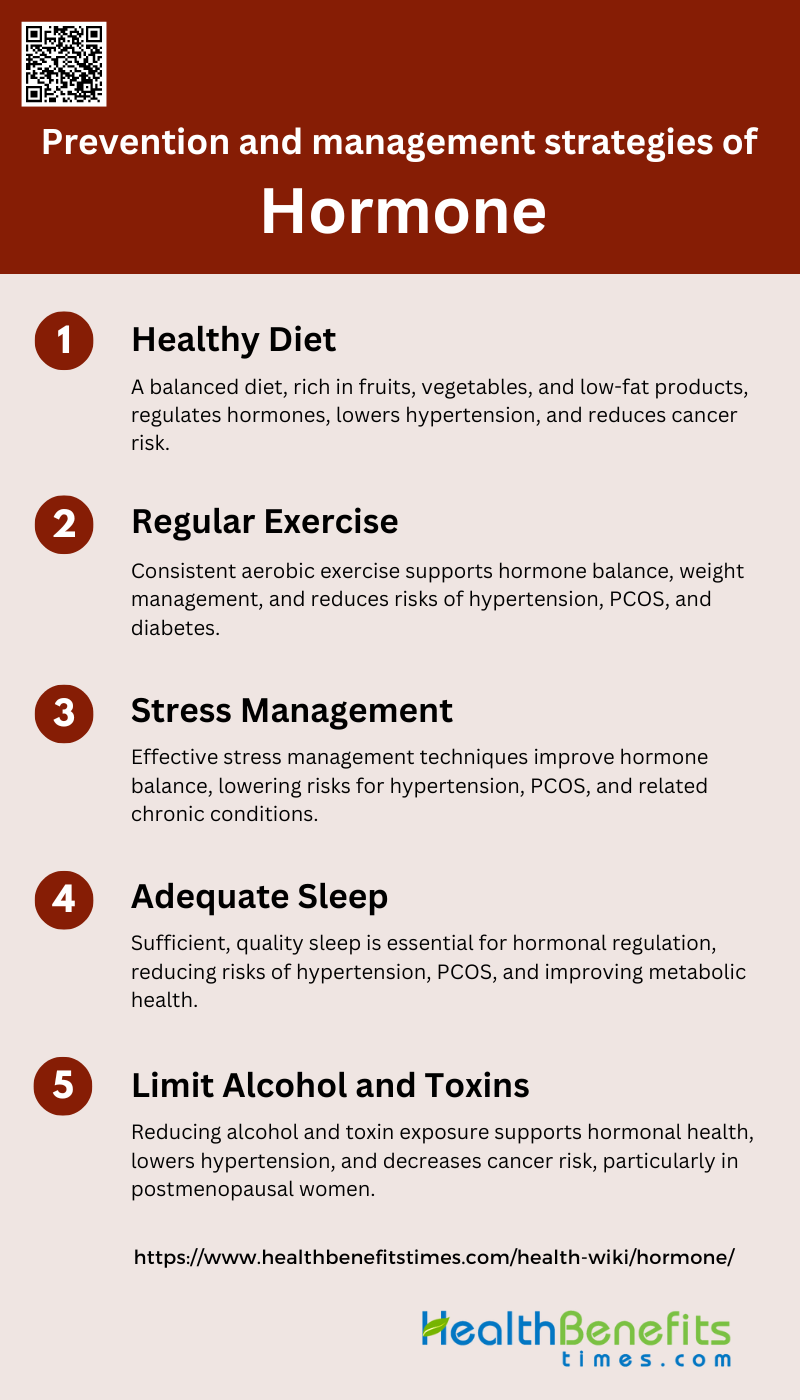Hormones are biochemical substances produced by specific glands in the body, which act as messengers to regulate various physiological processes. They are secreted directly into the bloodstream and travel to target organs or tissues to elicit specific responses. While traditionally defined as substances produced by glands with internal secretion, the understanding of hormones has evolved to include a broader range of signaling molecules, such as cytokines and growth factors, which can act as hormones under certain conditions. Hormones play crucial roles in numerous bodily functions, including growth, metabolism, and mood regulation, and are integral to maintaining homeostasis. Their effects can vary significantly based on factors such as age, gender, and individual hormonal profiles, influencing everything from pain perception to stress responses.
Functions of Hormones
Hormones are essential biochemical messengers that regulate numerous physiological processes in the body. They impact everything from metabolism and growth to mood and reproductive health. Below is a detailed list of the primary functions of hormones:
1. Regulation of Bodily Processes
Hormones play a crucial role in regulating various bodily processes, including metabolism, growth, and development. Growth hormone (GH), secreted by the anterior pituitary gland, is essential for tissue and body growth. It influences hunger perception, fat mobilization, blood glucose levels, and insulin resistance, especially during metabolic stress. Additionally, hormones like insulin and glucagon, produced by the pancreas, are vital for maintaining blood glucose homeostasis. Insulin promotes glucose uptake and storage, while glucagon stimulates glucose release from storage sites, ensuring a balanced metabolic state. These hormonal interactions are fundamental for the body’s growth and metabolic regulation.
2. Maintaining Homeostasis
Hormones are integral to maintaining homeostasis, including temperature regulation and fluid balance. The liver, a key metabolic organ, works in tandem with steroid hormones to maintain homeostasis and respond to stress. Growth hormone also plays a significant role in restoring homeostasis during metabolic stress by mobilizing energy substrates, preventing hypoglycemia, and stimulating feeding. Insulin and glucagon are crucial for blood glucose homeostasis, with insulin lowering blood glucose levels and glucagon increasing them as needed. This delicate balance ensures the body’s internal environment remains stable, allowing for optimal function.
3. Reproductive Functions
Hormones are essential for reproductive functions, including the menstrual cycle, pregnancy, and childbirth. Thyroid hormones (THs) are vital for female reproductive system homeostasis, regulating reproductive functions through various mechanisms involving thyroid hormone receptors and steroid hormone receptors. The hypothalamic-pituitary axis also plays a crucial role, with the pituitary gland releasing hormones like follicle-stimulating hormone (FSH) and luteinizing hormone (LH) that directly affect reproductive organs. These hormonal interactions ensure proper reproductive function and are critical for processes like ovulation, pregnancy, and fetal development.
4. Behavioral and Emotional Responses
Hormones significantly influence behavioral and emotional responses, such as stress response and mood regulation. The hypothalamic-pituitary axis is central to this, with hormones like adrenocorticotropin (ACTH) affecting stress responses. Growth hormone also impacts neuroendocrine responses during metabolic challenges, influencing energy expenditure and stress response. Additionally, hormones like serotonin and dopamine, although not detailed in the provided papers, are well-known for their roles in mood regulation and emotional well-being. These hormonal effects on behavior and emotions are crucial for adapting to environmental changes and maintaining mental health.
5. Homeostasis
Hormones help maintain internal balance by regulating blood sugar levels and fluid balance. Insulin and glucagon are key players in blood glucose homeostasis, with insulin promoting glucose uptake and storage, and glucagon stimulating glucose release from storage sites. The liver also plays a significant role in this process, working with steroid hormones to maintain homeostasis and respond to stress. Growth hormone contributes to homeostasis during metabolic stress by mobilizing energy substrates and preventing hypoglycemia. These hormonal mechanisms ensure the body’s internal environment remains stable, supporting overall health and function.
Types of Hormones
Hormones are diverse biochemical messengers that regulate various physiological processes in the body. They can be classified based on their structure, function, and the glands that secrete them. Below is a detailed list of the primary types of hormones:
1. Lipid-Derived Hormones
Lipid-derived hormones are primarily synthesized from cholesterol and include steroid hormones. These hormones are lipophilic, allowing them to easily pass through cell membranes. Examples include cortisol, aldosterone, and sex hormones like estrogen and testosterone. Structurally, they share a common four-ring carbon structure but differ in functional groups attached to this core. These hormones bind to intracellular receptors, forming hormone-receptor complexes that act as transcription factors to regulate gene expression. Their effects are broad, influencing metabolism, immune response, and reproductive functions.
2. Amino Acid-Derived Hormones
Amino acid-derived hormones are synthesized from single amino acids, such as tyrosine and tryptophan. Examples include thyroid hormones (thyroxine and triiodothyronine) and catecholamines (epinephrine and norepinephrine). These hormones are generally small molecules that can be either hydrophilic or lipophilic. They exert their effects by binding to specific receptors on the cell surface or within the cell, triggering a cascade of biochemical events. These hormones play crucial roles in regulating metabolism, growth, and stress responses.
3. Peptide Hormones
Peptide hormones are composed of short chains of amino acids and are synthesized as larger precursor proteins that are cleaved to form the active hormone. Examples include insulin, glucagon, and antidiuretic hormone (ADH). These hormones are hydrophilic and cannot pass through the cell membrane, so they bind to receptors on the cell surface. This binding activates second messenger systems, such as cyclic AMP, to elicit cellular responses. Peptide hormones regulate a variety of physiological processes, including glucose metabolism, water balance, and growth.
4. Steroid Hormones
Steroid hormones are a subset of lipid-derived hormones synthesized from cholesterol. They include glucocorticoids, mineralocorticoids, and sex steroids like estrogens, androgens, and progestins. These hormones are lipophilic and can diffuse through cell membranes to bind intracellular receptors. The hormone-receptor complexes then act as transcription factors to regulate gene expression. Steroid hormones are involved in a wide range of physiological processes, including metabolism, immune response, and reproductive functions.
5. Amine Hormones
Amine hormones are derived from amino acids and include both catecholamines and thyroid hormones. Catecholamines, such as epinephrine and norepinephrine, are derived from tyrosine and act on the sympathetic nervous system to regulate stress responses. Thyroid hormones, derived from tyrosine and iodine, regulate metabolism and energy balance. These hormones can be either hydrophilic or lipophilic and exert their effects by binding to specific receptors, either on the cell surface or within the cell, to initiate a series of biochemical events .
6. Protein Hormones
Protein hormones are composed of longer chains of amino acids and include hormones like growth hormone (GH) and follicle-stimulating hormone (FSH). These hormones are hydrophilic and cannot cross the cell membrane, so they bind to receptors on the cell surface. This binding activates intracellular signaling pathways, often involving second messengers like cyclic AMP, to elicit cellular responses. Protein hormones play critical roles in regulating growth, development, and reproductive functions.
Common Hormonal Disorders
Hormonal imbalances can lead to a variety of disorders that affect overall health and well-being. These disorders can impact metabolism, growth, mood, and reproductive functions. Below is a detailed list of some common hormonal disorders:
1. Diabetes Mellitus
Diabetes Mellitus is a chronic metabolic disorder characterized by high blood glucose levels due to either insufficient insulin production or the body’s inability to effectively use the insulin produced. It is broadly classified into Type 1 and Type 2 diabetes. Type 1 diabetes is an autoimmune condition where the immune system attacks insulin-producing cells in the pancreas. Type 2 diabetes, more common, is often associated with obesity and insulin resistance. Long-term complications of diabetes include cardiovascular diseases, neuropathy, nephropathy, and retinopathy. Effective management involves lifestyle changes, medication, and regular monitoring of blood glucose levels.
2. Thyroid Disorders
Thyroid disorders encompass a range of conditions affecting the thyroid gland, which regulates metabolism through hormone production. Hypothyroidism, characterized by insufficient thyroid hormone production, leads to symptoms like fatigue, weight gain, and depression. Hyperthyroidism, on the other hand, involves excessive hormone production, causing weight loss, anxiety, and palpitations. Autoimmune diseases such as Hashimoto’s thyroiditis and Graves’ disease are common causes of thyroid dysfunction. Diagnosis typically involves blood tests measuring levels of thyroid hormones and thyroid-stimulating hormone (TSH). Treatment varies from hormone replacement therapy for hypothyroidism to antithyroid medications and sometimes surgery for hyperthyroidism.
3. Adrenal Disorders
Adrenal disorders involve dysfunction of the adrenal glands, which produce hormones like cortisol, aldosterone, and adrenaline. Conditions such as Addison’s disease result from insufficient hormone production, leading to symptoms like fatigue, muscle weakness, and low blood pressure. Conversely, Cushing’s syndrome is characterized by excessive cortisol production, causing weight gain, hypertension, and osteoporosis. Adrenal tumors can also disrupt hormone balance. Diagnosis often includes blood and urine tests to measure hormone levels, imaging studies, and sometimes biopsy. Treatment depends on the specific disorder and may involve hormone replacement, medications to control hormone production, or surgical removal of tumors.
4. Polycystic Ovary Syndrome (PCOS)
Polycystic Ovary Syndrome (PCOS) is a prevalent endocrine disorder in women of reproductive age, marked by hyperandrogenism, ovulatory dysfunction, and polycystic ovarian morphology. It is associated with metabolic issues such as insulin resistance and obesity, increasing the risk of type 2 diabetes, cardiovascular diseases, and endometrial cancer. Symptoms include irregular menstrual cycles, hirsutism, and acne. Management involves lifestyle modifications, medications to regulate menstrual cycles and reduce androgen levels, and treatments for insulin resistance. Early diagnosis and intervention are crucial to mitigate long-term health risks and improve quality of life.
5. Growth Hormone Disorders
Growth hormone disorders arise from either excess or deficiency of growth hormone (GH) produced by the pituitary gland. GH deficiency in children leads to growth failure and short stature, while in adults, it can cause decreased muscle mass, energy, and quality of life. Conversely, excess GH results in conditions like gigantism in children and acromegaly in adults, characterized by abnormal growth of bones and tissues. Diagnosis involves measuring GH levels and imaging studies of the pituitary gland. Treatment may include GH replacement therapy for deficiencies or surgical, medical, and radiation therapies to reduce GH production in cases of excess.
6. Sex Hormone Disorders
Sex hormone disorders involve imbalances in estrogen, progesterone, and testosterone levels, affecting both reproductive and overall health. In women, estrogen and progesterone imbalances can lead to menstrual irregularities, infertility, and conditions like polycystic ovary syndrome (PCOS) and menopause-related symptoms. In men, low testosterone levels can cause reduced libido, erectile dysfunction, and decreased muscle mass. Hormonal imbalances can also increase the risk of osteoporosis and cardiovascular diseases. Diagnosis typically involves blood tests to measure hormone levels. Treatment options include hormone replacement therapy, medications to address specific symptoms, and lifestyle changes to improve hormone balance.
Causes of hormone imbalances
Hormone imbalances can result from a variety of factors, disrupting normal physiological functions. These imbalances can affect metabolism, growth, mood, and reproductive health. Below is a detailed list of common causes of hormone imbalances:
1. Chronic Stress
Chronic stress is a significant contributor to hormone imbalances, particularly through the dysregulation of the hypothalamus-pituitary-adrenal (HPA) axis. Prolonged stress can lead to elevated cortisol levels and decreased dehydroepiandrosterone (DHEA) levels, which are associated with various psychiatric and medical conditions such as major depression, diabetes, and insulin resistance. Additionally, stress-induced hormonal changes can impair cognitive function, especially in older adults, by altering levels of cortisol, thyroid hormones, and other critical hormones. Chronic stress also exacerbates metabolic and endocrine disturbances in obesity, further disrupting whole-body energy balance.
2. Natural Life Stages
Natural life stages, such as aging, significantly impact hormone levels. As individuals age, the production and regulation of many hormones decline, leading to a state of multiple hormone deficiencies. This decline can cause various health issues, including cardiovascular diseases, cancer, obesity, diabetes, osteoporosis, and dementia. The circadian cycles of these hormones also become irregular, contributing to inefficient and sometimes harmful hormone activity. Addressing these deficiencies through well-dosed hormone supplements and lifestyle changes can potentially slow down or reverse the signs and symptoms of aging.
3. Medical Conditions
Medical conditions can profoundly affect hormone balance. For instance, thyroid disorders can disrupt the levels of thyroid-stimulating hormone (TSH) and thyroid hormones, which are crucial for normal physiological functions. Genetic factors account for a significant portion of the variability in these hormone levels, but medical conditions such as thyroid diseases can further exacerbate imbalances. Additionally, conditions like obesity are linked to endocrine and metabolic perturbations, including those induced by chronic stress, which can alter adipose tissue metabolism and contribute to further hormonal imbalances.
4. Lifestyle Choices
Lifestyle choices, including smoking, alcohol consumption, diet, and exercise, play a crucial role in hormone regulation. For example, smoking has been shown to decrease TSH levels while increasing triiodothyronine (T3) and thyroxine (T4) levels. Body mass index (BMI) is positively correlated with TSH and free T3 levels, while excess iodine intake can increase TSH levels and decrease thyroid hormone levels. These lifestyle factors can significantly impact thyroid function and overall hormonal balance, highlighting the importance of healthy lifestyle choices in maintaining hormonal health.
5. Medications
Medications can also lead to hormone imbalances. Pharmacological treatments aimed at normalizing hormonal output are often necessary to address conditions caused by hormonal dysregulation. For instance, treatments that target stress-induced hormonal alterations, such as elevated cortisol levels, can help mitigate psychiatric and medical disease states. Additionally, hormone replacement therapies are commonly used to address deficiencies that occur with aging, aiming to restore hormonal balance and improve health outcomes.
6. Environmental Factors
Environmental factors, including exposure to pollutants and endocrine-disrupting chemicals (EDCs), can significantly impact hormone levels. EDCs can interfere with hormonal signaling pathways by binding to hormone receptors and altering gene expression, production, metabolism, and transfer of hormones. These disruptions can lead to various health issues, including impaired neurodevelopment in children and altered thyroid function in adults. Lifestyle factors such as smoking, diet, and BMI also interact with environmental factors to influence hormone levels, particularly thyroid hormones.
7. Genetic Factors
Genetic factors play a substantial role in hormone regulation, contributing to up to 65% of the variability in thyroid-stimulating hormone (TSH) and thyroid hormone levels. Genetic predispositions can influence how individuals respond to environmental stressors and lifestyle choices, further affecting hormone balance. Additionally, genetic factors can interact with epigenetic modifications induced by stress exposure, contributing to endocrine changes and metabolic disorders such as obesity. Understanding the genetic basis of hormone regulation is crucial for developing personalized treatment strategies.
8. Endocrine Gland Issues
Issues with endocrine glands, such as the thyroid, pituitary, and adrenal glands, can lead to significant hormone imbalances. For example, thyroid disorders can disrupt the production and regulation of thyroid hormones, which are essential for normal physiological functions. Chronic activation of the hypothalamus-pituitary-adrenal (HPA) axis due to stress can also lead to endocrine disturbances, contributing to conditions like obesity and cognitive impairment. Addressing these glandular issues through medical interventions and lifestyle changes is essential for restoring hormonal balance and improving health outcomes.
Common symptoms of Hormone
Hormone imbalances can manifest through a variety of symptoms, affecting both physical and emotional health. These symptoms can range from fatigue and weight changes to mood swings and reproductive issues. Below is a detailed list of common symptoms of hormone imbalances:
1. Fatigue and Weakness
Fatigue and weakness are common symptoms associated with hormone imbalances, particularly in conditions like hypothyroidism and growth hormone (GH) deficiency. Patients with hypothyroidism often experience fatigue and lethargy due to the reduced metabolic rate caused by low thyroid hormone levels. Similarly, individuals with GH deficiency, especially after traumatic brain injury, report chronic fatigue and reduced physical performance. GH replacement therapy has been shown to alleviate these symptoms, improving energy levels and reducing fatigue. Additionally, partial androgen deficiency in aging men can lead to weakness and fatigue, impacting their overall vitality and energy levels.
2. Weight Changes
Hormonal imbalances can significantly affect body weight. Hypothyroidism is commonly associated with weight gain due to a slower metabolism, while hyperthyroidism can lead to weight loss. In trans individuals undergoing hormonal treatment, weight changes are also prevalent. Trans men often report weight gain, while trans women may experience both weight gain and changes in body composition. Additionally, GH replacement therapy in individuals with GH deficiency has been shown to improve body composition, reducing fat mass and increasing lean body mass, which can influence overall weight.
3. Mood Swings and Mental Health Issues
Hormonal fluctuations can have profound effects on mood and mental health. For instance, changes in sex hormone levels during puberty, menopause, and other life stages are linked to increased rates of depression and mood swings, particularly in women. Hypothyroidism can also cause mood disturbances, including depression and irritability. In aging men, partial androgen deficiency is associated with depressive symptoms, anxiety, and irritability, which can be alleviated to some extent by androgen replacement therapy. Trans individuals undergoing hormonal treatment may experience emotional instability and mood swings, particularly during the initial stages of treatment.
4. Changes in Heart Rate and Blood Pressure
Hormonal imbalances can lead to changes in heart rate and blood pressure. Thyroid hormones play a crucial role in cardiovascular health, with hypothyroidism often causing bradycardia (slow heart rate) and hyperthyroidism leading to tachycardia (fast heart rate) and hypertension. Menopausal women may also experience palpitations and changes in blood pressure due to fluctuating hormone levels. In trans individuals, hormonal treatment can affect cardiovascular parameters, although specific changes in heart rate and blood pressure are less frequently reported.
5. Skin and Hair Changes
Hormonal imbalances can manifest in various skin and hair changes. Hypothyroidism often results in dry skin and hair loss, while hyperthyroidism can cause thinning hair and warm, moist skin. Menopausal women may experience changes in skin texture and hair thinning due to decreased estrogen levels. In trans individuals, hormonal treatment can lead to skin and hair changes, such as increased acne and balding in trans men and improved skin texture in trans women. Aging men with partial androgen deficiency may also notice decreased body hair and skin alterations.
6. Reproductive and Sexual Health Issues
Hormonal imbalances can significantly impact reproductive and sexual health. Thyroid dysfunction can lead to menstrual irregularities, reduced fertility, and complications during pregnancy. Menopausal women often experience decreased libido and vaginal dryness due to reduced estrogen levels. In aging men, partial androgen deficiency can cause decreased libido, erectile dysfunction, and reduced sexual satisfaction. Trans individuals undergoing hormonal treatment may experience changes in sexual desire and function, with trans men reporting increased sexual desire and trans women experiencing decreased sexual desire.
7. Sleep Disturbances
Sleep disturbances are commonly associated with hormonal imbalances. Hypothyroidism can cause excessive sleepiness and fatigue, while hyperthyroidism may lead to insomnia and restlessness. Menopausal women often report sleep problems, including difficulty falling asleep and night sweats, due to fluctuating hormone levels. In trans individuals, hormonal treatment can affect sleep patterns, with some reporting improved sleep quality and others experiencing temporary sleep difficulties. Additionally, partial androgen deficiency in aging men is linked to insomnia and disrupted sleep.
8. Digestive Issues
Hormonal imbalances can affect digestive health. Hypothyroidism is often associated with constipation due to a slower metabolic rate, while hyperthyroidism can cause diarrhea and increased bowel movements. Menopausal women may experience digestive issues such as bloating and changes in bowel habits. In trans individuals, hormonal treatment does not typically focus on digestive symptoms, but changes in body composition and metabolism could potentially influence digestive health. Aging men with partial androgen deficiency may also experience gastrointestinal symptoms, although these are less commonly reported.
9. Temperature Sensitivity
Temperature sensitivity is a common symptom of hormonal imbalances. Hypothyroidism often causes cold intolerance due to a reduced metabolic rate, while hyperthyroidism can lead to heat intolerance and excessive sweating. Menopausal women frequently experience hot flashes and night sweats due to fluctuating estrogen levels. In trans individuals, hormonal treatment can lead to changes in temperature sensitivity, with trans men reporting increased sweating and hot flashes, and trans women experiencing similar symptoms. Aging men with partial androgen deficiency may also report changes in temperature sensitivity, including increased sweating and heat intolerance.
Prevention and management strategies of Hormone
Maintaining hormonal balance is crucial for overall health and well-being. Effective prevention and management strategies can help mitigate the impact of hormone imbalances. Below is a detailed list of prevention and management strategies for hormone imbalances:
1. Healthy Diet
A healthy diet plays a crucial role in hormone regulation and overall health. Research indicates that dietary modifications, such as reducing sodium intake and following the Dietary Approaches to Stop Hypertension (DASH) diet, can significantly lower blood pressure and reduce the risk of hypertension. Additionally, a diet rich in fruits, vegetables, and low-fat dairy products, while maintaining adequate intake of potassium, magnesium, and calcium, is recommended for managing hypertension and other chronic conditions. For postmenopausal women, a varied dietary pattern similar to the Mediterranean diet has been shown to control detrimental estrogen levels, thereby reducing the risk of breast cancer. Overall, a balanced diet is essential for maintaining hormonal balance and preventing various health issues.
2. Regular Exercise
Regular exercise is a cornerstone of hormone management and overall health. Studies have shown that engaging in 30 to 45 minutes of aerobic exercise on most days of the week can significantly reduce the risk of hypertension and improve cardiovascular health. Exercise also plays a vital role in managing weight, which is crucial for individuals with conditions like polycystic ovary syndrome (PCOS) and type 2 diabetes mellitus (T2DM). For postmenopausal women, combining exercise with dietary interventions has been found to be particularly effective in controlling estrogen levels and reducing breast cancer risk. Overall, regular physical activity helps in maintaining hormonal balance, improving metabolic health, and reducing the risk of chronic diseases.
3. Stress Management
Effective stress management is essential for maintaining hormonal balance and overall well-being. Psychological stress, such as post-traumatic stress disorder, has been linked to an increased risk of hypertension, although more research is needed to confirm the antihypertensive benefits of stress management techniques. Stress management is also recommended as an intervention for individuals at risk of developing high blood pressure. For women with PCOS, behavioral interventions aimed at reducing stress can improve reproductive and metabolic outcomes. Overall, incorporating stress management techniques into daily life can help mitigate the adverse effects of stress on hormonal health and reduce the risk of related chronic conditions.
4. Adequate Sleep
Adequate sleep is vital for hormonal regulation and overall health. Poor sleep patterns, such as short sleep duration and circadian disruption, have been associated with an increased risk of hypertension. Ensuring sufficient and quality sleep can help in maintaining hormonal balance and reducing the risk of chronic diseases. For individuals with conditions like PCOS and T2DM, adequate sleep is crucial for managing symptoms and improving metabolic health. Overall, promoting healthy sleep patterns is an essential component of lifestyle interventions aimed at preventing and managing hormonal imbalances and related health issues.
5. Limit Alcohol and Toxins
Limiting alcohol and toxin intake is crucial for maintaining hormonal balance and overall health. Excessive alcohol consumption has been linked to an increased risk of hypertension and breast cancer. For postmenopausal women, reducing alcohol intake is recommended as part of a comprehensive strategy to lower breast cancer risk. Additionally, lifestyle interventions for managing T2DM and PCOS emphasize the importance of limiting alcohol and avoiding toxins to improve metabolic and reproductive health. Overall, minimizing the intake of alcohol and other harmful substances is essential for preventing hormonal imbalances and reducing the risk of chronic diseases.
FAQs
1. What are bioidentical hormones, and how are they used in hormone therapy?
Bioidentical hormones are synthetic hormones that are chemically identical to those the human body produces naturally. They are often used in hormone replacement therapy (HRT) to treat symptoms of menopause or other hormonal imbalances. Bioidentical hormones can be custom-made by a pharmacist based on a doctor’s prescription, and they come in various forms, such as pills, creams, and patches.
2. Can diet alone correct hormonal imbalances?
While diet plays a significant role in hormone regulation, it is often not sufficient by itself to correct severe hormonal imbalances. A healthy diet can support overall hormonal health, but some conditions may require additional interventions, such as medication, hormone therapy, or lifestyle changes.
3. How does aging affect hormone levels?
As people age, the production and regulation of many hormones decline. This decline can lead to symptoms such as decreased energy, reduced libido, and changes in metabolism. Hormone replacement therapy and lifestyle modifications can help manage these changes and improve quality of life.
4. What role do hormones play in weight management?
Hormones like insulin, leptin, and ghrelin significantly influence weight management by regulating hunger, metabolism, and fat storage. Imbalances in these hormones can lead to weight gain or difficulty losing weight, and addressing these imbalances is crucial for effective weight management.
5. How do environmental factors impact hormone levels?
Exposure to environmental factors such as endocrine-disrupting chemicals (EDCs) can interfere with hormone production and function. These chemicals are found in various sources, including plastics, pesticides, and personal care products, and can lead to hormonal imbalances that may affect reproductive health, metabolism, and more.
6. Are there natural ways to balance hormones without medication?
Yes, natural methods such as maintaining a balanced diet, regular exercise, managing stress, getting adequate sleep, and reducing exposure to toxins can help support hormonal balance. However, for more severe imbalances, medical intervention may still be necessary.
7. Can hormonal imbalances be detected through regular blood tests?
Yes, hormonal imbalances can often be detected through blood tests that measure levels of specific hormones, such as thyroid hormones, insulin, cortisol, and sex hormones. Your healthcare provider can interpret these results and recommend appropriate treatment.
8. How do hormones influence mental health?
Hormones like serotonin, dopamine, cortisol, and sex hormones play crucial roles in regulating mood, stress responses, and overall mental health. Imbalances in these hormones can contribute to conditions such as depression, anxiety, and mood swings.
9. What is the difference between hypothyroidism and hyperthyroidism?
Hypothyroidism is a condition where the thyroid gland produces insufficient thyroid hormones, leading to symptoms like fatigue, weight gain, and depression. Hyperthyroidism, on the other hand, occurs when the thyroid produces too much hormone, resulting in symptoms such as weight loss, anxiety, and rapid heart rate.
10. How do hormones affect reproductive health in both men and women?
In women, hormones regulate the menstrual cycle, ovulation, and pregnancy, while in men, they control sperm production and libido. Imbalances in reproductive hormones can lead to conditions such as polycystic ovary syndrome (PCOS), infertility, and erectile dysfunction.



